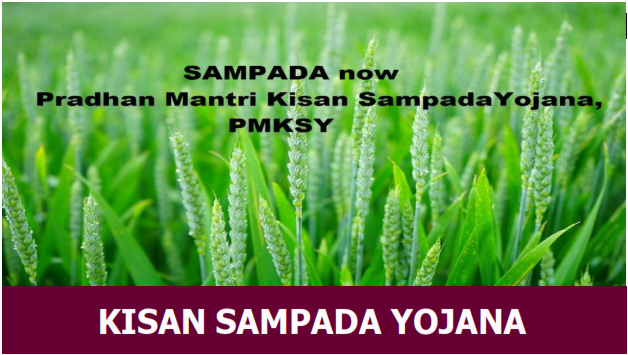KISAN SAMPADA YOJANA : Civil Services Mentor Magazine: SEPTEMBER - 2017

:: KISAN SAMPADA YOJANA ::
Though agriculture contributes only 1/4th of Indian GDP, it sustains
approximately 2/3rd of the population and continues to determine the growth rate
of the national economy. Moreover, India has natural comparative advantage in
agriculture with 161 million hectares of arable land ( of which 55 MH is
irrigated) and widely diverse agro-climatic zones. Indian Agriculture,
therefore, can be easily diversified to meet diverse demands
of both domestic and overseas consumers. Indian farm produce has unique aroma,
flavour and taste and if processed, packaged and marketed properly, could
capture the world market. Even at the present level of productivity, which is
less than half of US level, India is the third largest producer of food in the
world, covering a wide range of agri-produce.
Food processing enhances shelf life and adds value even if the agri produce is merely cleaned, sorted and packaged. Further processing into high value-added product is even more advantageous.Value addition enablesremunerative prices to farmers. Enhanced shelf life leads to reduction in wastages. Food processing is moreover employment intensive and creates 1.8 jobs directly and 6.4 indirectly across the supply chain for every Rs. 1 million invested. It provides convenience & safe food to consumers and promotes diversification and commercialisation of agriculture by providing effective linkage between consumers and farmers. Moreover, it makes farm produce more exportable the share of the processed food in the global agricultural exports of about $520 bn (Year 2003, Source: FAO) over the last 20 years has increased from half to two third and the trend is accelerating. Promotion of food processing thus is necessary for the national economy, the farmers and the consumers.
Growth of food processing is also inevitable with rising incomes, favourable demographic transition and changing consumption pattern. Households would shift substantially in the higher income group in the coming 10 years. Population in the age group of 20-54 years, which can afford and would need convenience food, would grow at 3%. [1991370m, 2001- 452 m, 2010 E-577m]. Moreover, food consumption is continually shifting in favour of packaged/processed food. Between 93-94 & 2000-01, manufacturing of food & beverages grew by 7.0%, while agriculture & livestock grew by 3.7% only.
Various measures have been taken by the government to give a boost to the food processing sector. With these measures food processing sector has grown at 7 per cent. In order to arrest postharvest losses of horticulture & non-horticulture produce, the Ministry has accorded approval to 42 Mega Food Parks and 236 Integrated Cold Chains for creation of modern infrastructure for the food processing along the value chain from the farm to the market.
Government has approved a new Central Sector Scheme-KISAN SAMPADA YOJANA (Scheme for Agro-Marine Processing and Development of Agro-Processing Clusters) with an outlay of Rs. 6,000 crore for the period 2016-20 coterminous with the 14th Finance Commission cycle to promote food processing in the country. KISAN SAMPADA YOJANA is an umbrella scheme with the following components:
(a)Mega Food Parks
(b)Integrated Cold Chain and Value Addition Infrastructure
(c)Creation / Expansion of Food Processing& Preservation Capacities
(d)Infrastructure for Agroprocessing Clusters
(e)Creation of Backward and Forward Linkages
(f)Food Safety and Quality Assurance Infrastructure
(g)Human Resources and Institutions
The schemes being implemented under the KISAN SAMAPADA YOJANA are applicable throughout the country and these are not state specific. The schemes are private sector driven and provide freedom to the entrepreneurs to choose the project location based on availability of raw material, technoeconomic feasibility and viability of the project.
The govt. has taken several other steps to promote food processing sector in
the country. A Special Fund of Rs. 2000 Crore has been setup in NABARD to make
available affordable credit to designated food parks and agroprocessing units in
such designated food parks. Food and agro-based processing units and cold chain
infrastructure have been classified under agriculture activities for Priority
Sector Lending (PSL) as per
the revised RBI Guidelines issued on 23rd April,2015.
As per extant policy, Foreign Direct Investment FDI upto 100%, under the automatic route is allowed in food processing industries. Further, 100% FDI is now permitted under Government approval route for trading, including through ecommerce, in respect of food Kisan Sampada Yojana products manufactured and/ or produced in India.
Ministry of Food Processing Industries has entered into agreements/Memorandum of Understating (MoUs) with France and Italy for bilateral co-operation in the field of Food Processing Sector.
Salient features of these agreements/MoUs are (i) to attract investment for
infrastructure development of food processing sector, (ii) developing
institutional co-operation, and (iii) participation in food fairs, conferences
workshops, etc. In order to have collaboration in technologies, teaching,
research and skill development in the food processing sector, Memorandum of
Understandings (MoUs) have also been entered with institutions in some countries
by the two institutions under the administrative control of this Ministry namely
National Institute of Food Technology Entrepreneurship and Management (NIFTEM)
and Indian Institute of Food Processing
Technology (IIFPT).

